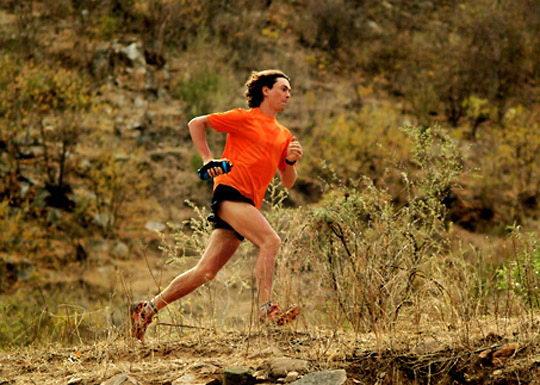Going the Distance. Ultra-marathoner Scott Jurek Pushes Mind and Body to the Edge of Endurance
超越身心的极限——CNN专访超级马拉松名将斯科特·尤雷克

SANJAY GUPTA, CNN CORRESPONDENT:Scott Jurek has been called the "King of Pain" and the greatest ultra-marathoner ever. Ultra-marathons can be 125 miles longer than a typical 26-mile marathon.
CNN特派员 桑杰·古普塔:斯科特·尤雷克被人们称为“痛苦之王”也是史上最了不起的超级马拉松选手。比起一般26英里长的马拉松,超级马拉松的长度可能要多出125英里。
Scott finished his first in 1994, and since then, he's dominated the sport. Today he holds records for these races that cover more than 150 miles and last over 24 hours straight. A notoriously3tough ultra-marathon is the 135-mile Bad water in Death Valley, California. In 2005, to get through the 130-degree heat, Scott was dunked in this king-sized cooler full of ice water.
斯科特在1994年跑完他的第一场超级马拉松赛跑,此后就称霸了这项运动。如今他在超过 150英里及连续24小时以上的比赛中都是纪录保持者。其中一场特别艰苦的超级马拉松比赛,就是在加利桶尼亚死亡谷举行的 135英里坏水河超级马拉松。 2005年参赛时,斯科特为了挨过130℃的高温,全身浸泡在这个装满冰水的大型冰桶里。
Halfway through the race, he collapsed, and for 10 minutes he didn't move. But he managed to get up and not only finish the race, but shatter the course record.Scott says it was his mother, Lynn, who taught him how to persevere. She died last March after living with multiple sclerosis for 30 years.
他在比赛半途累倒在地上,长达10分钟一动不动。不过,他还是勉强爬了起来.不但完成比赛,还打破了比赛纪录。斯科特说,是母亲琳恩教会了他如何坚忍不拔。他的母亲患多发性硬化症30年后,在去年3月逝世。
So what propels you to be able to do some of these things? Running the distances you do? A lot of people wouldn't even dream of it.
是什么促使你有办法做到这些事情?跑那么远的距离?这是许多人做梦都不敢想的事情。
SCOTT JUREK, ULTRA-MARATHONER:I think for me it's that self-exploration, that idea of there's something out there and the desire to see what my body, what my mind and down to what my spirit can do.
超级马拉松选手 斯科特·尤雷克:对我来说,我想是自我探索'吧,我知道外面有个未知的世界,还有渴望知道自己的身体、心智、终究说来是精神,可以达到什么地步。
SANJAY GUPTA, CNN CORRESPONDENT:Were you always a runner? I mean, how did this start?
CNN特派员 桑杰·古普塔:你一直都在进行跑步吗?我是说,你是怎么开始参与这种运动的?
SCOTT JUREK, ULTRA-MARATHONER:For me, I actually used to hate running. I grew up hunting and fishing in northern Minnesota, and that really was where 1got connected with the outdoors. And I had got[ten] interested in running through Nordic ski racing and had to get ready for the... basically, the snow season by doing some running on the ski trails.
超级马拉松选手 斯科特·尤雷克:其实我以前不喜欢跑步。我小时候经常在明尼苏达州北部打猎和钓鱼,也就是这样的经历让我喜爱野外。我后来是因为参加北欧滑雪比赛而对跑步产生兴趣,因为我必须先在滑雪道上跑步,为即将来临的雪季做准备。
SANJAY GUPTA, CNN CORRESPONDENT:You obviously do this competitively. What's the furthest distance you've ever run?
CNN特派员 桑杰·古普塔:你跑步的好胜心显然很强。你跑过最长的距离是多远?
SCOTT JUREK, ULTRA-MARATHONER:The furthest distance I've run is 165.7 miles in 24 hours.
超级马拉松选手 斯科特·尤雷克:我跑过最长的距离,是在 24小时内跑了165.7英里。
SANJAY GUPTA, CNN CORRESPONDENT:So tell me how that works. Are you taking breaks or what are you doing?
CNN特派员 桑杰·古普塔:告诉我你是怎么做到的。你中途休息了吗?还是做了什么?
SCOTT JUREK, ULTRA-MARATHONER:So the more time I take breaks... the clock is always going, so the idea is to continue running through out and as much as you can, 'cause you only get 24 hours. And the only times I did stop were to go to the bathroom, basically, and even eating is done on the run.
超级马拉松选手 斯科特·尤雷克:我休息的时间越多……时间不会等我,所以重点就是从头到尾持续地跑,尽自己所能尽量地跑,因为你只有 24个小时。基本上,我会停下来的时候只是为了上厕所,连吃东西都是边跑边吃。
SANJAY GUPTA, CNN CORRESPONDENT:Have you heard about the medical aspects of this? What have you been told?
CNN特派员 桑杰·古普塔:你有没有听说过医学方面的说法?有人跟你说过什么吗?
SCOTT JUREK, ULTRA-MARATHONER:Well, I think it helps... I'm actually a physical therapist and so know a little bit about the body. But you know is it healthy to go that far in that amount of time? You know, it's hard to say, but the human body was built for endurance. If you look at our ancestors and what they did... I mean, even think of my great grandparents and what they did for work out in the fields, and I think maybe our perception of what is normal has changed over the years. And I like to always refer to what people used to do.
超级马拉松选手 斯科特·尤雷克:我觉得有帮助……其实我本身是物理治疗师,所以对人体稍有了解。不过,在那样的时间里跑那么远健康吗?很难说,可是人体天生就有忍耐力。看看我们的祖先及他们所做的事情……我是说,甚至看我曾祖父母在田里工作的情形。我认为我们对于何谓正常的看法多年以来可能已经有所改变。我总是喜欢参照人们从前做的事。
SANJAY GUPTA, CNN CORRESPONDENT:You talk about exploration and maybe to some extent exploring what the body can do, but at some point you made the decision to say, I'm gonna go from someone who didn't like to run to racing in the hardest, presumably, running competitions in the world. Was there a moment when that happened for you and you said,"I can actually do this"?
CNN特派员 桑杰·古普塔:你提到了探索,在某种程度上可能也在探索人体能够做到什么地步。不过,你毕竟还是做了个决定,从原本不喜欢跑步,到参加堪称世界上最艰苦的跑步比赛。是不是有某个时间点让你突然改变心意,对自己说"我做得到吗" ?
SCOTT JUREK, ULTRA-MARATHONER:I think it was probably after my first 50-miler, after my first ultra-marathon. I'd run a marathon and then a month later decided to do this 50-mile race. A buddy of mine, Dusty Olson, said you've got to try this out.
超级马拉松选手 斯科特·尤雷克:我想大概是在我参加了第一场50英里的比赛之后,在我的第一场超级马拉松赛之后。我当时跑完了一场马拉松,一个月后决定参加这场50英里的赛跑。我的一位朋友达斯延·欧森说,你一定要跑到英里试试。
And at 20 years old, most 20-year-olds aren't thinking about running 50 miles, but after I had completed that I said, of course, "Never again." But it was after a few hours, and I was like, "You know yeah, I can... I think I can be pretty good at this."
当时我才 20岁。大多数 20岁的年轻人通常不会想要跑到英里,所以我完成那场比赛之后,原本也是说再也不要了。“不过,才几个小时之后,我就不禁觉得其实,我可以……我觉得我可以在这种运动中表现得不错。”
SANJAY GUPTA, CNN CORRESPONDENT:Are you competing when you're out there? Are you competing against the other racers? Against yourself? Running away from something?
CNN特派员 桑杰·古普塔:你在比赛的时候是在竞争吗?你是在和其他选手竞争?还是和自己竞争?或是想逃离什么?
SCOTT JUREK, ULTRA-MARATHONER:I like to say I'm trying not to compete. I'm trying to work with my body. I'm not competing against myself. Obviously, there's a clock out there. And I do use the other racers in the competition to push my body to that edge because the competition really helps, you know explore those boundaries--you know, what am I capable of?
超级马拉松选手 斯科特·尤雷克:我会说我尽量不要去竞争。我尽量和自己的身体协调合作,而不是和自己竞争。当然比赛会计时,而我确实会利用同一场比赛中的其他选手来敦促自己把体能发挥到极限,因为竞争确实有助于探索体能的极限,看我自己能做到什么程度。



